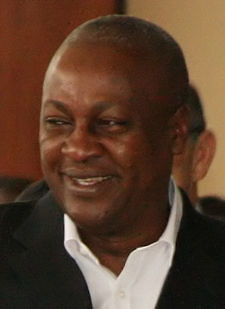
Republic of Ghana Vice-President John Dramani Mahama had recently launched a new website. The site features articles by him that have been published in journals throughout the world. He was sworn in as president after the death of John Atta Mills., a photo by Pan-African News Wire File Photos on Flickr.
Ghana extends voting to Saturday after technical hitch
4:16pm EST
* Voting under way in race considered too close to call
* Ghana cited as model democracy in Africa's "coup belt"
* Stakes increased by rising oil output
By Kwasi Kpodo and Richard Valdmanis
ACCRA, Dec 7 (Reuters) - Ghana extended voting in its presidential election into a second day, officials said on Friday, after a rash of technical problems prevented thousands of people in the West African state from casting their ballots on time.
The decision was broadly accepted by political parties and voters, who hoped the poll would entrench Ghana's reputation as a bulwark of democracy and progress in a region better known for civil wars, coups and corruption.
"People who lined up to vote today but were unable to do so will be able to cast their ballot tomorrow," said Election Commissioner Kwadwo Afari-Gyan. Polling stations would reopen at 7:00 a.m. (0700 GMT), he said.
Many newly introduced electronic fingerprint readers, used to verify people's identities, malfunctioned on Friday, slowing voting and creating long lines at polling stations nationwide that could not be cleared.
A spokesman for the main opposition party said the glitches had affected hundreds of thousands of people, though the electoral commission declined to give an estimate.
A Reuters correspondent found several polling stations in Accra where fingerprint readers were not working, though other stations completed voting and were tallying ballots.
"We have been standing here for five hours. Our line is not moving," said Alice Hayford, a 44-year-old market trader on the western outskirts of the capital Accra, shortly before polls were due to close.
The election pits President John Dramani Mahama, who replaced the late John Atta Mills after his death in July, against Nana Akufo-Addo of the New Patriotic Party (NPP), who has vowed to provide free education and root out corruption.
Opinion polls point to a tight race, raising the prospect of a repeat of the near-deadlock of the 2008 elections, in which Mills defeated Akufo-Addo in a run-off with a margin of less than 1 percent.
Results are expected within two days of polls closing, with a second round possible at the end of December if no one wins an outright majority.
FIVE-HOUR WAIT
President Mahama, voting in his home town of Bole in northern Ghana, said that, despite the delays, the election was on course to solidify the country's democratic advances.
"This election is going to consolidate Ghana's democratic credentials once and for all. After we go through this, I believe there will be no doubt, no questions, about the fact that Ghana is a leading democracy in Africa."
Ghana's 2008 election was close enough to spark fears of conflict, but its ability to return from the brink led U.S. President Barack Obama at the time to dub Ghana a "model democracy" in Africa.
After casting his ballot in his native Kyebi, in Ghana's east, Akufo-Addo said the outcome of the vote was "in the hands of the Ghanaian people", and said he had seen no signs of fraud. His NPP party issued a statement late on Friday saying "the election is capable of passing of fairly and freely" if voters are allowed to cast their ballots.
Ghanaians are also electing a parliament, where Mahama's National Democratic Congress (NDC) has enjoyed a slim majority.
OIL HOPES
Ghana has had five peaceful and constitutional transfers of power since its last coup in 1981, in stark contrast to the turmoil that surrounds it in the region.
Neighbouring Ivory Coast tipped into civil war last year after a disputed 2010 poll, and regional neighbours Mali and Guinea-Bissau have both suffered coups this year.
While economic woes grip Europe and the United States, Ghana, also a major cocoa and gold producer, is expected to post economic growth of about 8 percent next year and is increasingly praised by investment bankers and fund managers.
"These elections are important not just to Ghana, but for the growing number of states and actors seeking to benefit from increasing confidence in Africa," said Alex Vines, Africa Research Director at Chatham House.
Across the capital Accra, evidence of the resource wealth abounds: brightly lit multi-storey buildings, cranes looming over new construction sites, well-paved roads, and billboards advertising banks, cars and mobile phones.
But many Ghanaians have been left out. An influx of people from rural parts of the country, hoping for jobs in the capital, has created a sprawl of outlying shanty towns and swelled the ranks of the homeless on the city's streets.
Akufo-Addo, a trained lawyer and son of a former Ghanaian president, has criticised the ruling party for the slow pace of job creation and the fight against poverty, and says he would use oil money to pay for free primary and secondary education.
Mahama, meanwhile, says he aims to boost Ghana's per capita annual income to $2,300 by 2017 - double that in 2009.
But in a country where campaign messages rarely influence voting choices, many believe most of the 14 million voters will cast their ballots based on ethnic, social or regional ties.
No comments:
Post a Comment